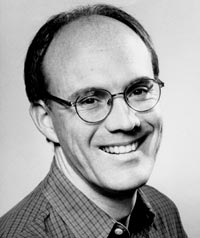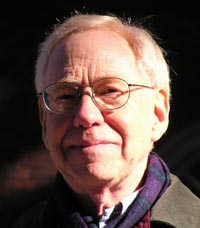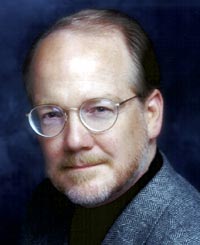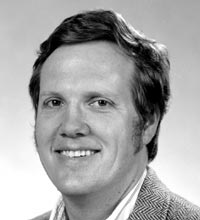UC Berkeley Press Release
Five UC Berkeley professors to be honored today
BERKELEY – Five faculty members at the University of California, Berkeley, will join the campus's elite ranks of teaching excellence today (Tuesday, April 27) when they are presented with the 2004 Distinguished Teaching Award.
The award, bestowed by the Berkeley Division of the Academic Senate's Committee on Teaching, is the highest honor for instruction given by UC Berkeley. Only five percent of those who have taught at the campus since 1959 - the year the awards began - have received this award. This year's recipients bring the total to 215.
The 2004 awardees, all from the College of Letters & Science, are F. Michael Christ, professor of mathematics; Hubert L. Dreyfus, Professor of Philosophy in the Graduate School; H. Mack Horton, professor and chair of East Asian Languages and Cultures; Robert Jacobsen, associate professor of physics; and Linda Williams, professor of film studies and rhetoric and director of the Film Studies Program.
The winners will be honored this evening by Chancellor Robert M. Berdahl and others at a 5 p.m. ceremony in Zellerbach Playhouse. The event is open to the public. Awardees will each receive a certificate and $10,000 award from UC Berkeley, as well as a gift from the California Alumni Association.
F. Michael (Mike) Christ
Department of Mathematics
Mike Christ, professor of mathematics, is following in the footsteps of his mentors, all of them great teachers. He owes a debt, he said, to the "two wonderful math teachers" at his high school in Milwaukee, several role models at Harvey Mudd College and Pomona College, his dissertation advisor at the University of Chicago and his post-doctoral advisor at Princeton University.
 Mike Christ |
And he's having fun doing it. "I feel lucky I'm able to earn a living talking about something I like so much," he said.
This enthusiasm gets through to his students.
"During my time as an undergraduate, I have encountered very few professors with the devotion and commitment to their students that I have seen in Professor Christ," wrote a former student, in recommending Christ for the award. "He is truly an educator in every sense of the word."
Christ uses no special gimmicks when engaging the great range of students he teaches. Yet, he manages to hold the attention of large lecture classes like Math 1B, the 400- to 500-student freshman calculus class. For Christ, teaching this course is just as interesting and as challenging as instructing upper level and graduate students.
He also realizes that teaching students math instills concepts important for a variety of careers in life, whether business, law or computer science. Even those students fascinated by mathematical concepts, not just the calculational aspects of mathematics, won't necessarily go on to graduate school in math, he said.
"Problem solving, perseverance, independence, organization - all are honed and developed in math study," said Christ.
Students of his who do become mathematicians point to Christ as a mentor, one who inspired them with a love of teaching.
"Mike Christ has become a principal role model for me in my career as a mathematics professor," wrote one of Christ's former postdocs, James Colliander, today an assistant professor of mathematics at the University of Toronto, in his recommendation.
Hubert Dreyfus
Department of Philosophy
Hubert Dreyfus, Professor of Philosophy in the Graduate School, says his ultimate goal in teaching is learning.
 Hubert Dreyfus |
"Since I see my lectures not primarily as occasions to teach but rather as opportunities to learn, I take students' questions and objections as essential to the course of the lecture rather than a distraction from it," said Dreyfus. Over the years, he has taught such courses as "Existentialism in Literature and Film," " Heidegger's 'Being and Time,'" and "The Effect of Disembodiment on the Internet."
His dedication is clear. For the past two decades, he routinely has made audio tapes - now audio files on the course Web site - of each of his lectures so students can catch up on any classes they have missed and can review the class discussions when writing their papers.
And each day before he lectures on a certain topic, Dreyfus listens to the tape of the last time he gave that lecture. "I feel elated at the moments when things went well and the students and I learned something together, and discouraged when a long discussion led nowhere," said Dreyfus. "Somehow this helps me get in the right mood and to profit from past successes and failures."
The reward for his efforts, he said, is sharing along with his students the pleasure of learning from the greatest thinkers of all time.
"But that would not be rewarding unless what we learned was relevant to our lives, " Dreyfus said. He noted a special satisfaction he experiences when former students come up to him in the supermarket or send him an e-mail "saying that what they learned in one of my courses changed their lives."
Dreyfus, who earned his B.A., M.A. and Ph.D. from Harvard University, taught at Harvard, Brandeis University and MIT before coming to UC Berkeley in 1968. In 2003, he received the Rhoda H. Goldman Award for Distinguished Faculty Advising of Undergraduates.
"Professor Dreyfus's students see and experience first hand that great research flows directly from great teaching, and he exemplifies all the virtues I associate with the great teachers: expertise (of course), but also flexibility, open-mindedness, the ability to hear the best in what students say and to bring that excellence out in their work, and, most importantly, the almost magical ability to make philosophy happen," wrote Iain Thomson, assistant professor of philosophy at the University of New Mexico and a former undergraduate student of Dreyfus, in recommending Dreyfus for the award.
H. Mack Horton
East Asian Languages and Culture
When H. Mack Horton was in graduate school at UC Berkeley, several of his teachers inspired him to try to return the favor.
 H. Mack Horton |
Now a UC Berkeley professor of East Asian Languages and Culture, and chair of that department, Horton has done just that - and his receipt of a 2004 Distinguished Teaching Award confirms it.
"After tenure, this is the best thing that has happened in my career," Horton said from his office in Durant Hall, the same space occupied by his mentor Helen McCullough when Horton was her student 25 years ago. She and her husband, William McCullough, were professors of East Asian languages then.
"She was very scholarly; he was very warm and a great bibliographer," Horton recalled. "You felt so lucky to be one of their students, you had to pass it on."
Horton also is indebted to Kinjiro Kaneko, a retired scholar he met during his junior year studying in Japan. Kaneko "was a god" and "a wonderful teacher" who helped him throughout his five-year dissertation effort, he said.
Today, Horton leads undergraduate survey courses and graduate seminars on pre-modern Japanese literature, which he called "the Japanese equivalent of Chaucer and Shakespeare."
Horton said that he hopes students, by translating and analyzing ancient texts, expand their appreciation of the sources of modern Japan and the diversity of the human experience and recognize their own intellectual, cultural and linguistic foundations.
His techniques in the classroom include showing slides of seasonal imagery or landscapes described in texts, playing recordings of lute music to which an epic war story was once recited, and speeding up videotapes of Noh dramas to recreate the quicker pace of their performances centuries ago.
Horton said he fuels his own enthusiasm by trying to excite his students: "After all these years, I still feel a sort of frisson before going into the classroom."
"I see how he is not only informing his students about Japanese literature, but encouraging them to question received wisdom and to strike out on their own. I am more than a little proud that such fine teaching is taking place in our department," said Jeffrey Riegel, a UC Berkeley professor of Chinese.
"His attitude and teaching style have forced me to reconsider what it means to be a teacher and mentor to others," said a former undergraduate student at UC Berkeley who is now a graduate student in Japanese Studies at Osaka University of Foreign Studies.
Robert (Bob) G. Jacobsen
Department of Physics
When teaching required courses like physics for biology majors and premeds, the challenge is to engage the 50 percent of the class that doesn't want to be there. For associate professor of physics Bob Jacobsen, that's the fun part.
 Bob Jacobsen |
"A lot of teaching, particularly in large lectures to keep them from getting way too dry, is taking advantage of every opportunity you've got to convey an idea or help students practice whether they understand the idea, maybe even help them confront the fact that they don't understand the idea," he said. "Sometimes it's a student's question, or bringing in a current event to talk about. There are always targets of opportunity you can grab."
Several students raved about a Physics 8A demonstration in which Jacobsen, in response to a student question about center-of-mass and a child's ability to pump himself into motion on a stopped swing, shot video of his son at a playground and analyzed the mechanics in class.
He's also been known to bring real, physical data from his own experiments to class to spark up discussions. Jacobsen is an experimental particle physicist who has spent the past 10 years working with a large collaboration called BaBar, based at the Stanford Linear Accelerator Center. The goal is to smash matter and antimatter together and look for peculiarities in the debris that emerges from the collision.
While many details of these matter-antimatter interactions may be beyond his introductory physics students, he often takes a few of them to Stanford to show them the set up and perhaps stimulate in them a greater interest in physics.
For those increasing number of physics majors, Jacobsen also has revitalized the Society of Physics
Students, improved advising, created a lunchtime seminar series that highlights career prospects for physics majors outside the usual graduate school track, and developed a sophomore seminar for students considering majoring in physics.
"I consider him to be an exemplar of how faculty members in a research university can contribute to revitalizing undergraduate education," wrote Christina Maslach, Vice Provost for Undergraduate Education and Professor of Psychology, in recommending Jacobsen for the award.
Jacobsen's skill with teaching physics comes naturally, with no tricks.
"My approach to teaching is, I like doing it," he said.
Linda Williams
Department of Rhetoric
Film Studies Program
Linda Williams, professor of film studies and rhetoric, believes anyone can watch and enjoy a film, and that the obvious and easy pleasures of the medium make everyone feel like an expert. She also knows it's not that simple.
 Linda Williams |
Teaching film and moving-image media is quite easy on one level, especially, said Williams, if one teaches popular "body genres" with visceral appeal. A professor at UC Berkeley since 1997 and the director of UC Berkeley's Film Studies Program, her courses have centered on cinema and the sex act, various sex genres, Spike Lee and Oscar Micheaux, racial melodrama, and more.
"But to teach film well is also hard," she said, "for one must complicate and question those apparently easy reactions and immerse students in a discipline that can be every bit as difficult and foreign as ancient Greek."
Williams, who earned her undergraduate degree in comparative literature at UC Berkeley and a Ph.D. in the same subject from the University of Colorado, recalled a day when, as a graduate student instructor, she walked into a classroom without her notes.
"Terrified without the armor of my notes, I connected with that class like no other," she said. "The lesson was certainly not to come to all future classes unprepared, but rather to be willing to abandon a carefully-crafted lecture to interact with more spontaneous student responses."
Acknowledging that she teaches courses that many consider frivolous, Williams said she counters that attitude by being "deadly serious, demanding, and even a little stern," and by giving formal lectures, quizzes, tough exams and papers. "In this way I encourage students to be serious, too," she said. "But this seriousness then earns us all the right to enjoy the inherent pleasures of these popular topics and to loosen up more in the second half of the class when student discussion becomes more dominant."
Williams "has come to embody the incomparable intellectual spirit that outsiders associate with Berkeley," wrote Brian Hu a, UC Berkeley senior with a double major in film studies and economics, in recommending Williams for the award.
Williams is proud of her students and noted she collaborated with seven graduate students to produce an anthology, "Porn Studies," to be published by Duke University Press.
She said she first felt the rewards of teaching as a 16-year-old swim instructor for young children: "Getting them to trust the water was my entrée into the discipline of challenge and encouragement that is teaching."
In the classroom today, Williams' most rewarding experience is the moment that students use what she's given them to think new thoughts. "It's actually the moment at which they begin not to need you that I find most exciting," she said.

